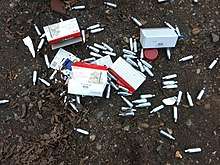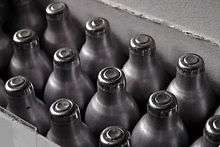Whipped-cream charger

A whipped cream charger (sometimes colloquially called a whippit, whippet, nossy, nang or charger) is a steel cylinder or cartridge filled with nitrous oxide (N2O) that is used as a whipping agent in a whipped cream dispenser. The narrow end of a charger has a foil covering which is broken to release the gas. This is usually done by a sharp pin inside the whipped cream dispenser. The nitrous oxide in chargers is also used as an oxidizer in hybrid model rocket engines.
The associated kitchen appliance which receives the charger is commonly known as a whipping siphon.
Description

The cylinders are about 6.3 cm (2.5 inches) long and 1.8 cm (0.7 inches) wide, and they are rounded at one end with a narrow tip at the other end. The chargers' walls are about 2 mm (about 1/16 inch) thick to withstand the great pressure of the gas contained within. Their interior volume is 10 cm3 and most brands contain 8 g of N2O under pressure. Used chargers are non-refillable, but 100% recyclable where steel recycling programs exist.
Production
In Europe, where production and use of whip cream chargers originated, there are presently three factories involved in its production. Standard size for whipped cream chargers is eight grams of nitrous oxide per cartridge. Whipped cream chargers are intended for low-volume or occasional use, such as home kitchens, restaurants, and coffee shop applications. For very high volume commercial use, there do exist regulated tank systems for filling much larger containers and dispensing more whipped cream. These are more desirable if volume is in excess of a production level of ten liters per hour. Whipped cream chargers are designed to be opened with a device that punctures the thin metal seal at the narrow end of the tube; whipped cream dispensers have this integrated into the device's cap.
Uses
Culinary
Nitrous oxide is used because it migrates easily into the cream, and does not cause the cream to oxidize while it is in the can. Cream must have a minimum fat content of 28% to produce whipped cream with a dispenser. To use a whipped cream dispenser, one starts by following a recipe — typically one cup of heavy cream, 2–3 tablespoons of sugar, and any flavorings/colorings as desired. The device is capped and one or two chargers are discharged into the unit, depending on its size. These pressurize the device with nitrous oxide and cause the fat-soluble gas to dissolve into the cream, just like carbon dioxide dissolves into water to create soda water. Shaking the dispenser a few times helps the gas dissolve. The dispenser is then ready for use.
When the cream dispenser's valve is opened, the cream is forced out of the nozzle by the high pressure. However, when the pressure is released, the dissolved gas turns to bubbles and comes out of the solution — just as opening a soda bottle results in the formation of a head of bubbles. These expanding bubbles instantly transform the cream into a frothy, whipped state. Nitrous oxide is bacteriostatic (inhibits bacteria growth) and a charged cream dispenser can be kept in the refrigerator for up to two weeks.
Recreational drug

Because of their availability, chargers are usually the method of choice for users seeking to use nitrous oxide recreationally.[1] Tanks of medical grade nitrous are difficult to obtain, and auto-grade nitrous contains substances such as sulfur dioxide to prevent human consumption. Chargers are cheaply available in many stores and online.
To inhale from a charger, users either fill a balloon using a cracker, or fill an empty whipped cream dispenser and inhale from it - inhaling directly from a cracker is particularly dangerous due to the risk of developing frost-bite on the inside of the mouth or oesophagus. [2][3] The 8 gram nitrous oxide aluminium cylinder charger when discharged into an empty whipped cream dispenser (Mosa Corp, Taiwan) creates a pressure of 30 pounds per square inch (200kPa) and delivers 3.24 litres of nitrous oxide gas.[4] A cracker is a small device, usually made from metal, which contains two halves. The bottom half is where the charger is placed, and the top half has a pin which pierces the foil of the charger. The top half screws onto the bottom half, and then releases the gas out the top. Using a balloon with the cracker is important because when the gas is released from the charger it is extremely cold and can cause frostbite in the lips, tongue, throat, and lungs, so the gas is allowed to warm up inside the balloon before inhaling.
Model rocketry
Whipped cream chargers are also used by model rocket enthusiasts for micro hybrid engines, where it acts as an oxidizer for solid fuels such as polyethylene or HTPB.
See also
References
- ↑ "Erowid Nitrous Vault : Nitrous Use Among Erowid Visitors".
- ↑ Hwang, JC; Himel, HN; Edlich, RF. "Frostbite of the face after recreational misuse of nitrous oxide". Burns. 22: 152–3. doi:10.1016/0305-4179(95)00090-9. PMID 8634126.
- ↑ "Obtaining Nitrous Oxide".
- ↑ Sellers WFS. Misuse of anaesthetic gases. Anaesthesia 2016;71:1140-1143 doi:10.1111/anae.13551
External links
| Wikimedia Commons has media related to Nitrous oxide. |